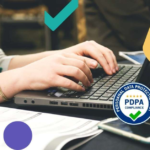
PDPA Compliance Singapore: 5 Strategies to Secure Your Business Data
November 26, 2024
PDPA Compliance – Common Mistakes Singapore Businesses Must Avoid
November 27, 2024In today’s competitive digital age, small businesses face unique challenges. While large corporations have the resources to invest heavily in sophisticated marketing technologies and expansive teams, small businesses often operate with tighter budgets and limited manpower. Yet, they are expected to deliver equally personalized, efficient, and impactful marketing strategies to compete in their respective markets.
Enter artificial intelligence (AI), the game-changer that has leveled the playing field. AI technologies, once exclusive to large enterprises, are now accessible to businesses of all sizes. These tools empower small businesses to achieve more with less by automating repetitive tasks, analyzing data, and delivering hyper-personalized customer experiences. Importantly, AI enables these businesses to remain competitive without the need for a massive financial outlay, making high-impact marketing a realistic goal.
This blog dives deep into how AI can revolutionize marketing for small businesses, even on a shoestring budget. From leveraging chatbots and predictive analytics to automating social media campaigns, we’ll highlight tools, real-world examples, and actionable strategies that make AI indispensable for small businesses striving to make big marketing impacts.
Why AI is the Future for Small Businesses
AI offers small businesses a unique opportunity to maximize their resources while scaling operations. Whether it’s automating customer service or personalizing marketing campaigns, AI enables small businesses to punch well above their weight.
Key Benefits of AI for Small Businesses
- Efficiency and Cost-Effectiveness
AI tools automate repetitive tasks like email scheduling, data analysis, and customer interactions, allowing small teams to focus on strategic planning. By cutting down on manual labor, businesses save both time and money. - Actionable Insights on a Budget
AI-driven analytics platforms provide affordable and easy-to-understand insights about customer behavior, preferences, and market trends. These insights allow businesses to make data-driven decisions without hiring expensive experts. - Enhanced Customer Engagement
Today’s customers expect personalized experiences. AI allows small businesses to offer recommendations, tailored communication, and customized offers, building stronger customer relationships. - Scalable Solutions
Unlike traditional systems, AI tools can grow with your business. Whether you’re catering to a small local audience or scaling to serve a national market, AI tools adapt to meet your needs without significant additional costs.
Affordable AI Applications for Small Businesses
Small businesses don’t need to break the bank to leverage AI. Let’s explore specific AI applications that are budget-friendly and transformative.
1. Chatbots for 24/7 Customer Support and Engagement
Chatbots are among the most practical AI tools for small businesses, providing instant, round-the-clock communication with customers. They can answer frequently asked questions, assist with purchases, or even escalate issues to human support when necessary.
Examples in Action:
- Retail: A small handmade jewelry store could use Tidio or Drift to respond to common customer queries, such as custom order timelines or delivery details. The chatbot can handle 90% of inquiries, freeing the business owner to focus on designing and crafting new pieces.
- Service Industry: A local wellness spa might employ Intercom to guide potential customers through booking appointments or understanding service packages. By providing immediate answers, the spa can convert more website visitors into paying customers.
- E-commerce: A small online store can integrate a chatbot like Chatfuel to provide personalized product recommendations. For instance, a customer browsing winter clothing could be shown suggestions based on their location’s weather or previous purchases, increasing the likelihood of a sale.

2. Automating Social Media Campaigns
Maintaining a strong social media presence is critical for small businesses, but it can be time-consuming. AI tools simplify this by automating post scheduling, analyzing audience engagement, and suggesting the best times to post for maximum impact.
Examples in Action:
- Social Scheduling with Buffer or Hootsuite: A small bakery can use AI-powered scheduling tools to post content consistently. By analyzing engagement trends, the tool might suggest posting photos of fresh pastries at 7 AM, aligning with when followers are most active.
- Content Creation with Canva: A boutique fitness studio can leverage Canva’s AI design features to quickly create visually appealing social media graphics. The platform’s templates save time and ensure professional-quality posts that resonate with their audience.
- AI-Driven Ads with Adzooma: A local pet grooming service could use Adzooma to optimize its Google Ads campaigns. By analyzing which keywords drive clicks, the tool ensures every marketing dollar is well spent, increasing the return on investment.
3. Personalized Email Marketing Campaigns
Email remains one of the most effective marketing tools for small businesses, and AI can make it even better. AI tools can segment audiences, craft personalized messages, and optimize delivery times to boost open and click-through rates.
Examples in Action:
- Retail and Discounts: A small fashion boutique might use Mailchimp to send tailored discount codes based on customers’ past purchases. For example, a customer who frequently buys handbags could receive an exclusive offer on the latest collection.
- Seasonal Campaigns: A local gardening store could use ActiveCampaign to send reminders about seasonal products. AI can analyze customer purchase history and suggest sending a promotion on winter plants to those who previously bought summer flowers.

4. Predictive Analytics for Smarter Decision-Making
Predictive analytics tools use AI to analyze historical data and predict future trends. This allows small businesses to plan more effectively, whether for inventory management, marketing campaigns, or customer outreach.
Examples in Action:
- Inventory Forecasting: A small bookstore could use Brightpearl to predict which genres will sell more during the holiday season, ensuring they stock enough inventory to meet demand.
- Customer Retention: A subscription-based meal kit service could use Looker to identify customers at risk of canceling. By offering a personalized discount or a free recipe kit, they can re-engage these customers and reduce churn.
Making AI Accessible: Tips for Small Businesses
- Start Small: You don’t need to adopt every AI tool at once. Begin with solutions that address your most pressing needs, such as chatbots for customer service or social media automation.
- Leverage Free or Affordable Tools: Many AI tools offer free tiers or affordable pricing plans tailored to small businesses. Explore platforms like HubSpot, Zoho, and Grammarly for budget-friendly options.
- Educate Your Team: Ensure your staff understands how to use AI tools effectively. This minimizes the learning curve and maximizes your investment.
Conclusion: Small Businesses, Big AI Potential
AI is no longer a luxury—it’s a necessity, even for small businesses operating on limited budgets. By adopting AI tools, small businesses can achieve remarkable marketing results, from personalized customer experiences to data-driven decision-making.
The examples above demonstrate that AI doesn’t have to be intimidating or expensive. With accessible tools like chatbots, social media automation platforms, and predictive analytics software, even the smallest enterprises can compete with larger companies and capture their share of the market.
In 2024 and beyond, embracing AI isn’t just about keeping up; it’s about staying ahead. Small businesses that integrate AI into their marketing strategies today are setting the foundation for sustainable growth, stronger customer relationships, and long-term success. Now is the time to unlock the transformative power of AI and make a big impact with every marketing effort.


